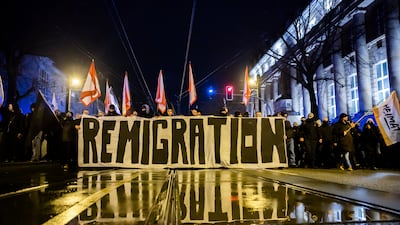Hungarian Prime Minister Viktor Orban has claimed immigration is responsible for a rise in incidents such as the deadly car-ramming attack on a Christmas market in the east German city of Magdeburg, saying the EU wants them “to happen to Hungary too”.
At least five people were killed, including a nine-year-old child, and 200 injured on Friday when a man drove a BMW into the market, which was teeming with shoppers. A 50-year-old Saudi doctor, Taleb A, who is critical of Islam and a supporter of Germany’s far-right, was arrested at the scene.
A group of about 1,000 people congregated in the city of Magdeburg on Saturday night after misinformation about the attacker was shared online. Some held a large banner with the words “remigration” written on it.
Mr Orban said, without offering evidence, that such attacks began to occur in Europe only after 2015, when hundreds of thousands of migrants and refugees entered the EU, many fleeing war and violence in the Middle East and Africa. Several militant attacks going back decades have taken place on the continent, including train bombings in Madrid in 2004 and attacks on central London in 2005.
However, Mr Orban said “there is no doubt that there is a link” between migration and terrorism, and claimed EU leadership “wants Magdeburg to happen to Hungary too”.
He expressed sympathy with the families of the victims of what he called a “terrorist act” in Magdeburg, but the long-serving Hungarian leader, one of the most vocal critics of the EU, also implied the 27-nation bloc's migration policies were to blame.

German authorities said the suspect has lived in Germany since 2006, practising medicine. He gained refugee status in 2016. Describing himself as a former Muslim, the suspect shared dozens of tweets and retweets daily focusing on anti-Islam themes, criticising the religion and congratulating Muslims who left the faith. He was charged with five counts of murder, several counts of attempted murder and several counts of dangerous bodily harm on Saturday night by a German court.
Mr Orban's anti-immigrant government has taken a hard line on people entering Hungary since 2015, building fences protected by razor wire on its southern borders with Serbia and Croatia.
In June, the European Court of Justice ordered Hungary to pay a fine of €200 million ($216 million) for persistently breaking the bloc’s asylum rules, and an additional €1 million a day until it brings its policies into line with EU law. Mr Orban, a right-wing populist, earlier vowed that Hungary would not change its migration and asylum policies regardless of any rulings from the EU's senior court.
On Saturday, he promised that his government will fight back against what he called EU efforts to impose immigration policies on Hungary.
Meanwhile, the German government was facing growing questions on Sunday about whether more could have been done to prevent the attack in Magdeburg.
Car attack at German Christmas market – in pictures
The suspect had made online death threats against German citizens and had a history of challenging state officialdom.
Saudi Arabia had warned German authorities about Taleb A after he posted extremist views on his personal X account that threatened peace and security. His social media posts include one from August in which he wrote: “Is there a path to justice in Germany without blowing up a German embassy or randomly slaughtering German citizens? … If anyone knows it, please let me know.”
Citing security sources, German daily newspaper Die Welt reported that state and federal police had carried out a “risk assessment” on Taleb A last year but concluded he posed “no specific danger”.
As an activist, he has helped women flee Gulf countries and complained that German authorities were not doing enough to assist them. At the same time, he has criticised the entry of other Muslim migrants and war refugees to Germany, and backed conspiracy theories about the “Islamisation” of Europe.
In previous brushes with the law, he was convicted and fined by a court in the city of Rostock in 2013 for “disturbing the public peace by threatening to commit crimes”, news website Der Spiegel reported. This year he was investigated in Berlin for the “misuse of emergency calls” after arguing with police at a station in Berlin.
He had been on sick leave from his workplace, a clinic near Magdeburg that treats offenders with substance addiction problems, since late October.
Chancellor Olaf Scholz condemned the “terrible, insane” attack and called for national unity amid high political tension as Germany heads towards elections scheduled for February 23.
The far-right AfD's parliamentary head Bernd Baumann demanded Mr Scholz call a special session of the Bundestag (Germany's parliament) on the “desolate” security situation, arguing that “this is the least that we owe the victims”.
And the head of the far-left BSW party, Sahra Wagenknecht, demanded that Interior Minister Nancy Faeser explain “why so many tips and warnings were ignored beforehand”. Of the 205 injured, about 40 were still in critical condition on Sunday, with doctors fighting to save their lives.














